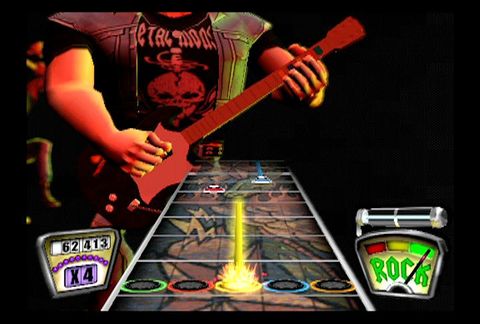Tuesday4 April 2006
One of the reasons people claim games aren't art is that they don't help you learn anything about yourself. Now that Guitar Hero exists, they'll have to change their tune. You don't learn anything profound, but you do learn all about your inner rock god.
Through a solid and handsome guitar peripheral, Harmonix's sensitive adaptation of melody, and a selection of 30 cover versions of hits from the likes of Motorhead and The Ramones, you'll discover whether you're a groover or a pogo-er. This is a game that you can play sitting down, but you won't. Not once.
The framework is familiar to any veteran of Frequency or Amplitude. Notes, corresponding to fret buttons on the guitar, travel down a lane toward you. Hit them right and you'll build up a combo; nail down sequences and you'll earn score-boosting power-ups. Players of Guitar Freaks will also recognise the peripheral; a replica guitar with fret buttons and a central strum bar.
The combination, however, produces something entirely distinct. The peripheral outclasses that available for Guitar Freaks: with five buttons, a two-way strum bar and a fully functional whammy, it encourages over-the-top performances.
Note patterns never feel arbitrary, and on the extreme difficulty setting they so accurately mirror the real thing that you're left with the unshakeable certainty that you now know how to play the guitar for real.
That authenticity gives Harmonix headaches, however. The digital nature of the tracks in Amplitude and Frequency means that the challenge is close to constant throughout each song. In Guitar Hero, you're all too likely to get a song which has a verse/chorus/verse section that's quickly mastered, followed by a pyrotechnic and disjointed solo which, while spectacular, can also produce an instant Game Over.
The scoring system also seems more arbitrary than the visual arithmetic offered by the previous games.

